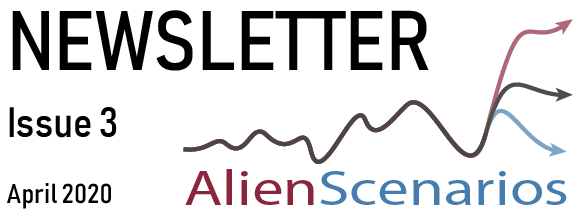
@AlienScenarios
franz.essl@univie.ac.at
guillaume.latombe@univie.ac.at
| Having trouble viewing this email? View it in your browser, or get it as a pdf. |
 |
https://alien-scenarios.org @AlienScenarios franz.essl@univie.ac.at guillaume.latombe@univie.ac.at |
|
|
|
|
|
Good
day! |
|
AlienScenarios in time of COVID-19 |
All AlienScenarios members are complying with the restrictions in place in their respective countries. The annual meeting originally planned for March 30-31 and the joint workshop with InvasiBES organised for April 1-3 in Girona, Spain, have been postponed until September 28 - October 2. In the meantime, an online workshop nonetheless took place on April 1-2 to foster progress on the issues (see below). As scientists doing mostly analytical research, we are lucky to be able to work from home with limited impact on our outputs. We encourage everyone to do the same insofar as possible to protect the health of our communities. Just as for biological invasions, this pandemic will be better fought of with cooperation between people and countries. We are also deeply grateful to all health workers, food workers, and other workers who are on the front line and more exposed than anyone else. For further information on the virus: the World Health Organisation website on the pandemic |
 |
|
Contribution to the IPBES alien species assessment |
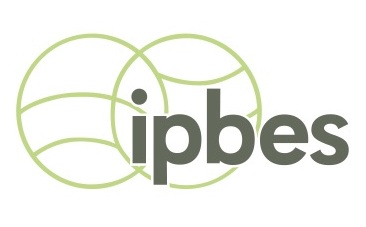 |
AlienScenarios is making an important contribution to the new IPBES
alien species assessment. Two members of the advisory board,
Helen Roy and
Aníbal Pauchard, are co-chairs leading the assessment team.
From the AlienScenarios core team, Hanno Seebens, Franck Courchamp and Bernd Lenzner are coordinating lead author,
lead author and fellow, respectively, in Chapter 2 of the
assessment: Status and trends [of invasive alien species]. Contributing to this assessment is an opportunity to provide a better understanding of the impacts of invasive alien species on biodiversity to decision makers worldwide, and help moving society towards a better future. |
|
Participation in the Macro 2020 conference: Macroecology of the Anthropocene |
| AlienScenarios was well represented at the Macro 2020 conference in the beautiful city of Konstanz, organised by AlienScenarios advisory board member Mark van Kleunen. Hanno Seebens gave an invited keynote talk on how to analyse human activity to predict the spread and establishment of neobiota. Franz Essl presented the whole AlienScenarios project. Bernd Lenzner and Guillaume Latombe presented two ongoing studies within the project. All abstracts can be found in the conference booklet. | 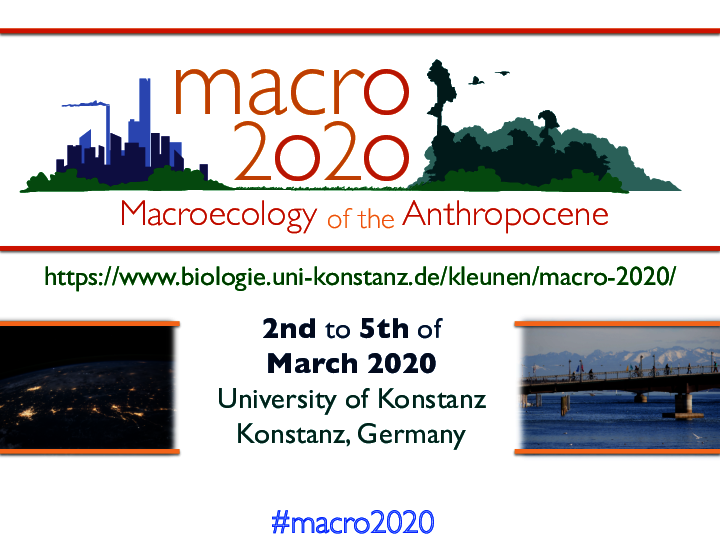 |
|
InvaCOST workshop |
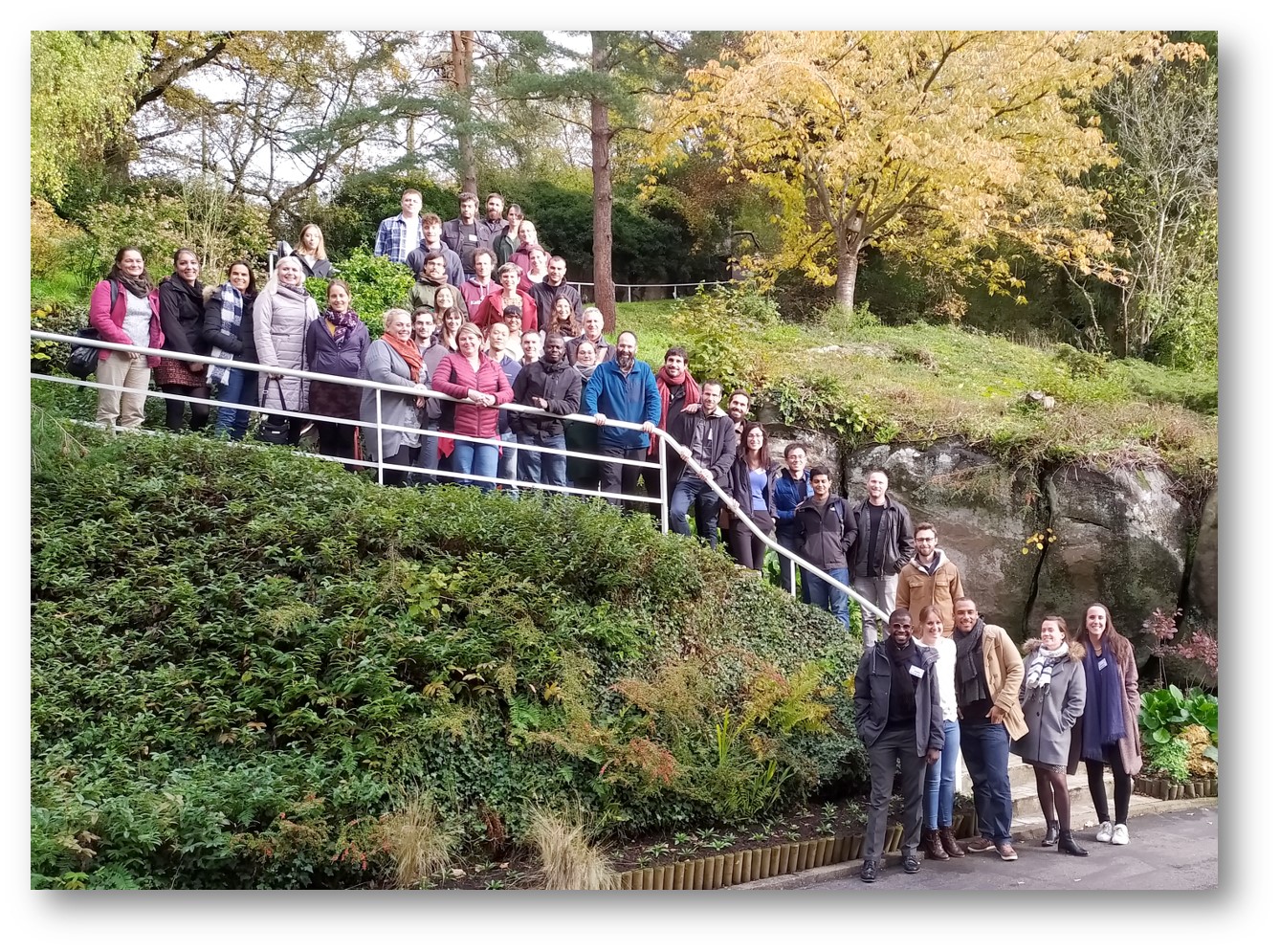 |
The InvaCOST workshop, organised by WP 3 team
leader Franck
Courchamp, was a great success. Fourty-seven participants
representing 27 countries, including experts from several
disciplines, taxonomic groups and ecosystems gathered in
Saint-Rémy-lès-Chevreuse, on the outskirts of Paris, on November
12-15 2020. 48 scientific articles making use of the new InvaCOST
database, the first global, comprehensive database on published
economic costs of biological invasions, have been initiated as a
result of this workshop. The second InvaCost workshop is scheduled for November 2020 and will focus on the links between economic and ecological impacts. |
|
Joint AlienScenarios & InvasiBES workshop on management scenarios |
| The joint physical workshop with InvasiBES organised for April 1-3 in Girona, Spain, has been postponed to September 30 - October 2. However, we met for an online workshop on April 1-2 to foster progress on the issues. The workshop was organized by Núria Roura-Pascual (WP IV), and Jonathan Jeschke & Wolf-Christian Saul (WP VII and partners in the InvasiBES project), in collaboration with Lucas Rutting (scenarios facilitator, Copernicus Institute of Sustainable Development, Utrecht University) and Garry Peterson (Stockholm Resilience Centre, Stockholm University). The workshop had about 30 participants, members of both the AlienScenarios and InvasiBES projects, but also relevant stakeholders on the management of biological invasions across Europe. In this online workshop consisting of two half-day sessions, we aimed to: (1) develop four different management strategies, and (2) downscale global future scenarios for biological invasions to the European scale. These two objectives were successfully accomplished using online videoconferencing, which proved an effective way to facilitate discussions within breakout groups. These results will serve as a starting point for the second part of the workshop in September/October, which will either be a physical meeting or a second online meeting depending on the COVID-19 situation. The organizers of the workshop would like to thank the involvement and enthusiasm of the collaborators (Lucas Rutting, Garry Peterson) and all participants. Without their commitment, time and expertise, the objectives of the online meeting wouldn’t have been accomplished. | 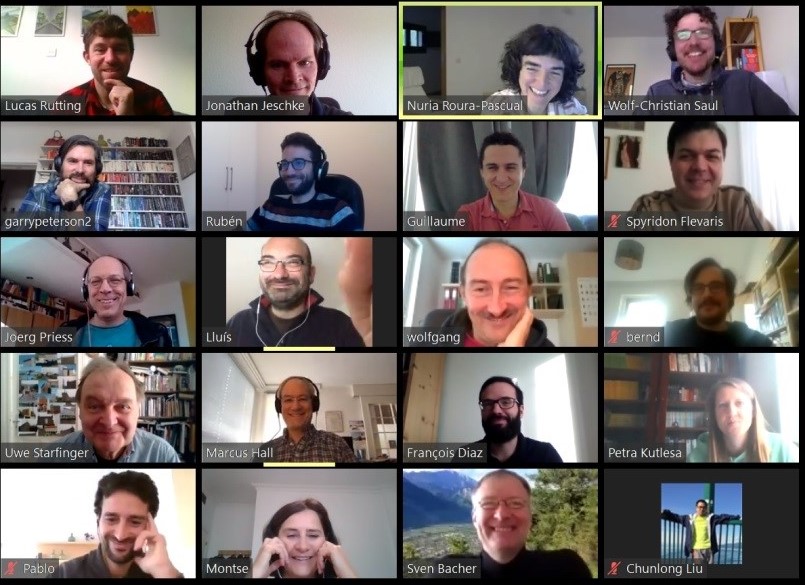 |
|
New article: Essl et al. (2020) A conceptual framework for range-expanding species that track human-induced environmental change. BioScience, 69(11), 908-919 |
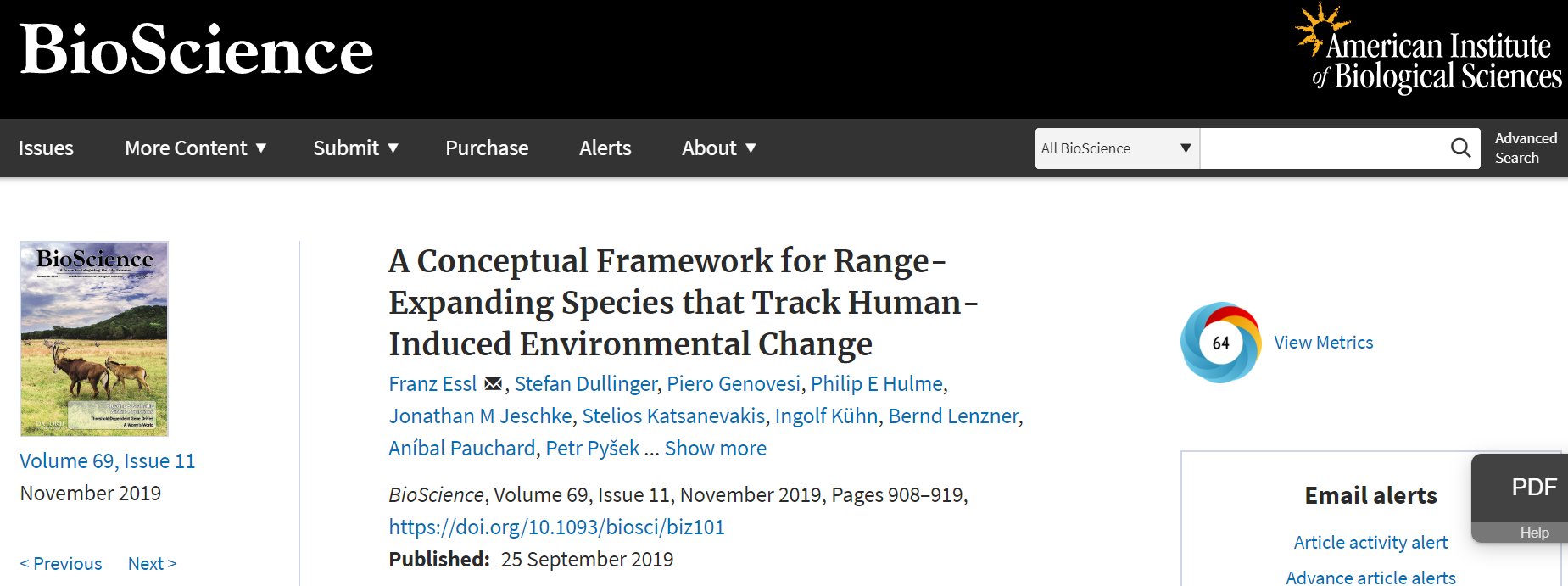 |
In
this article published in BioScience, Essl and colleagues present
a conceptual framework to elucidate the features of the rapid
increase in the number of species whose range dynamics are human
induced. They review the relationships and differences to both
natural range expansion and biological invasions. As
range-expanding species responding to human-induced environmental
change will become essential to consider for biodiversity
management and science in the Anthropocene, the term 'neonative'
is proposed to differentiate these taxa from traditional alien
species. You can access the article here. |
|
AlienScenarios early career researchers in the spotlight |
|
In
each issue of the Newsletter, we will highlight two early career
researchers who are part of the AlienScenarios team. In this
third issue, meet Christophe and Chunlong! |
| Christophe
Diagne I am a postdoc in the Biodiversity Dynamics & Macroecology group at the Lab of Ecology, Systematics & Evolution (University Paris-Saclay, France). I am involved in the AlienScenarios WP3 (Evaluating impacts on ecosystem services and human livelihoods). This WP is based on analyzing the most up-to-date and comprehensive global state-of-the-art of the economic costs of invasive alien species, i.e. the InvaCost database we recently constructed. Ultimately, our work will allow for evaluating and ranking different options for managing invasions according to different climatic and socio-economic scenarios, regions and possibly economic markets. Previously, I was affiliated with the Center for Biology and Management of Populations (Montpellier, France) where I did my PhD and my first post-doc on rodent-parasite interactions in the context of emerging zoonoses and changing environments (i.e. human disturbance and biological invasions). I led an integrative research using both correlative and experimental approaches that combine concepts and methods from community ecology, parasitology, immunoecology, molecular biology and biostatistics. In my free time, I enjoy my family (time does fly!), like active vacation through visiting new places, and live out my passion for soccer (ok, actually just watching…but it’s already so intense!). If I were a song, I would be High by James Blunt If I were a painting, I would be The scream, by Edvard Munch If I were a fictional character, I would be the Jon Snow If I were an alien species, I would be Mus musculus domesticus (so smart, so cute, so emblematic!...ok I’m a bit biased ^^) |
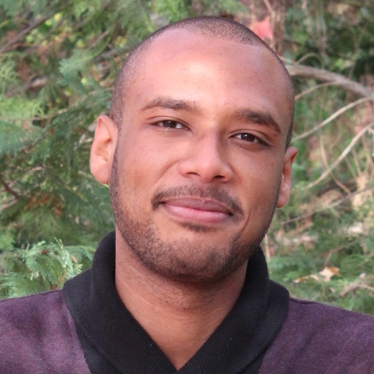 |
 |
Chunlong
Liu I am a postdoc in the Faculty of Sciences at University of Girona, Spain. I got my Ph.D. in Institute of Hydrobiology, University of Chinese Academy of Sciences, with a research focus on invasive freshwater fishes in China. I joined the AlienScenarios WP4 in March, and I will work with Nuria Roura-Pascual and Brian Leung to assess the consequences of different levels of implementation of regulations on the management of invasive species across Europe. In this two-year project, I will try to connect the quantitative models with realistic applications to contribute useful information to better allocate management resources. I also hope that these findings will be used to manage invasive species in other regions. In my free time, I usually go swimming, watch comedy movies and chat with friends. If I were a song, I would be Liekkas, by Sofia Jannok; If I were a painting, I would be Lantingji Xu, by Xizhi Wang. If I were a fictional character, I would be Sun Wukong. If I were an alien species, I would be Carassius auratus. |
 |
 |
|
Contact Us Visit us on the web at https:\\alien-scenarios.org |
If you no longer want to receive our emails, you can un-subscribe here. |